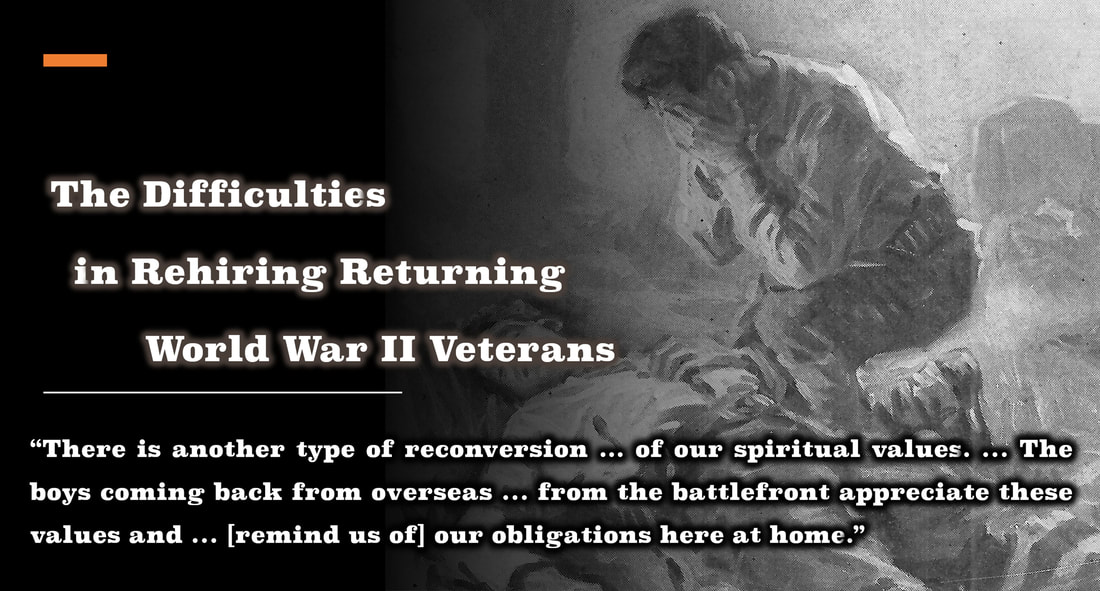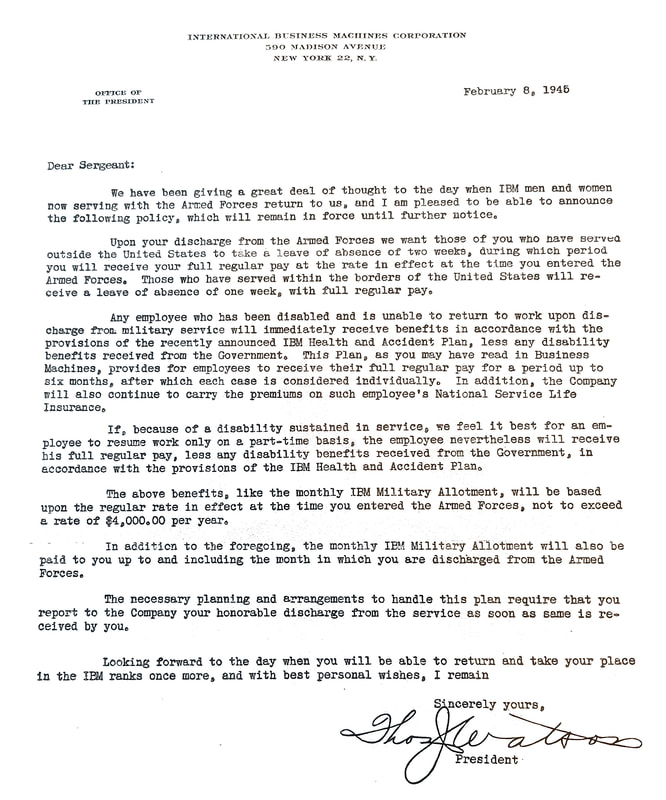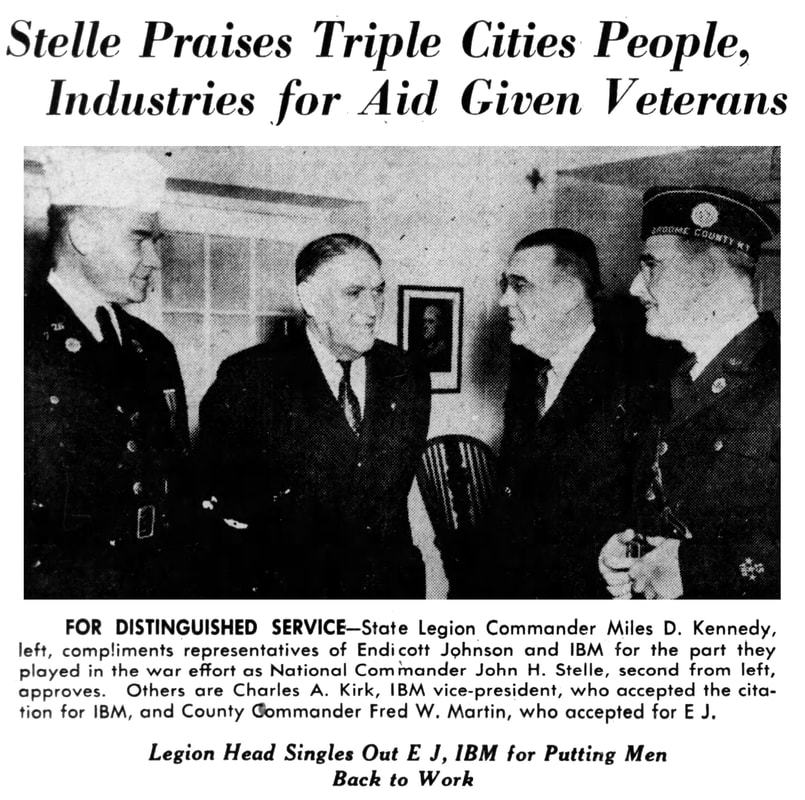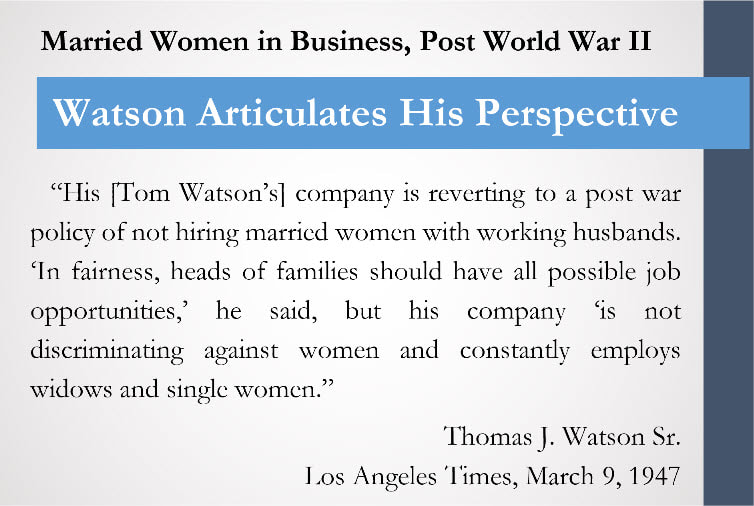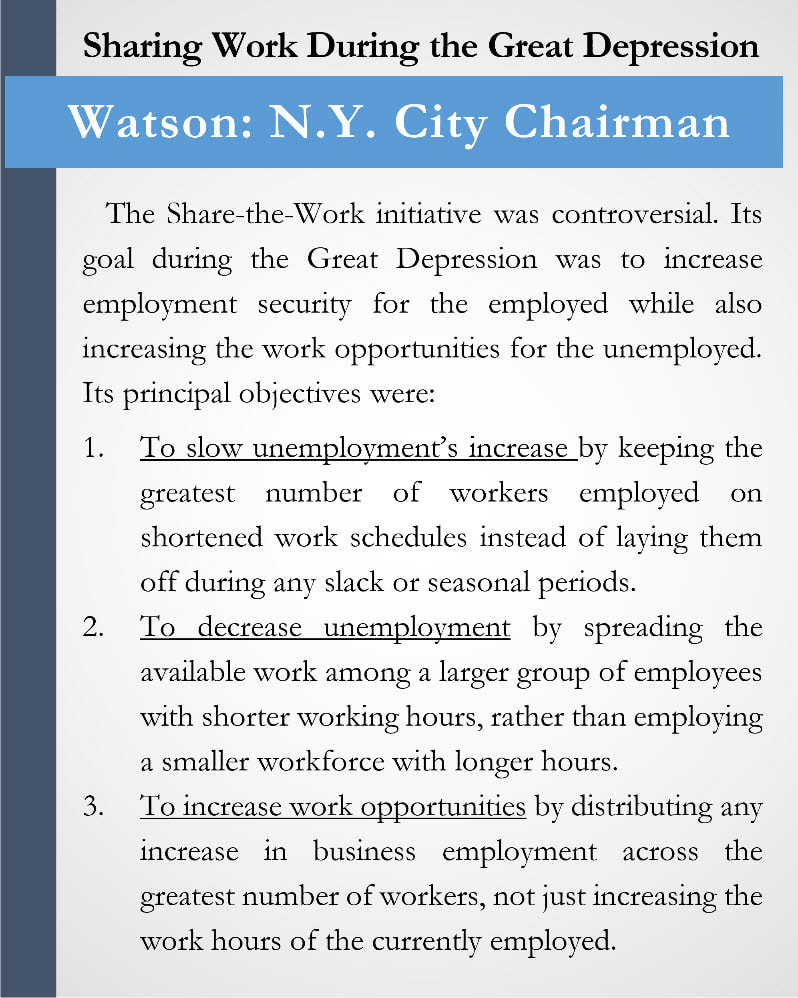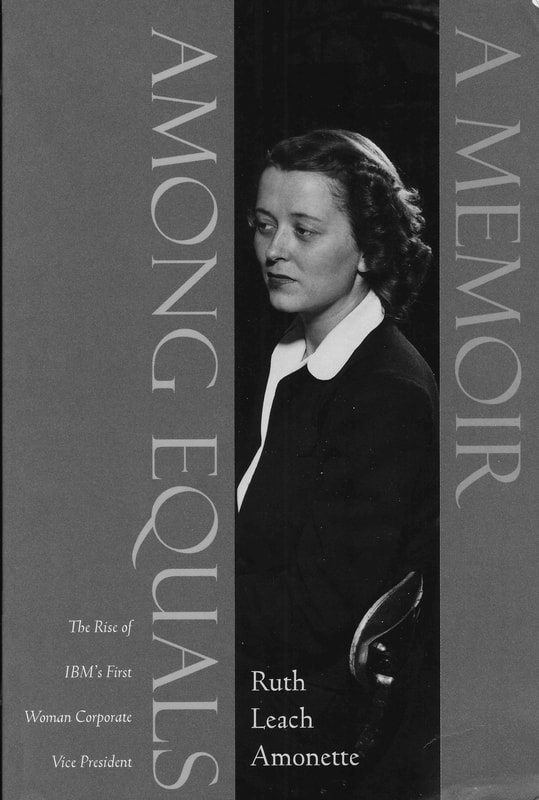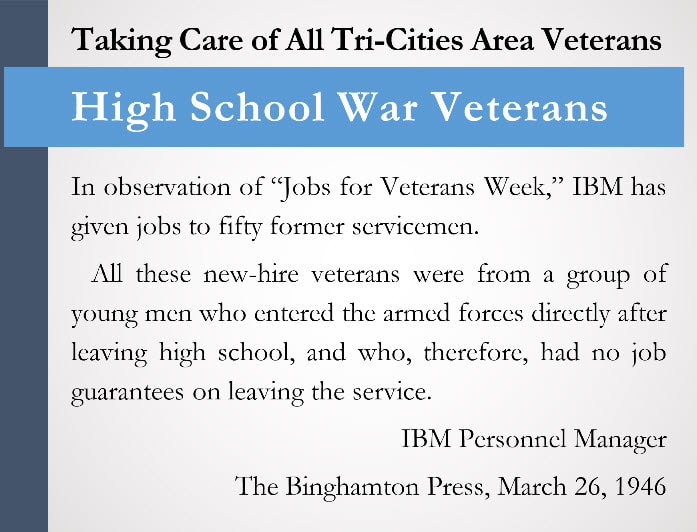The Issues Surrounding the Rehiring of World War II Veterans
Thomas J. Watson Supported IBM's Returning WWII Veterans
|
|
Date Published: November 6, 2021
Date Modified: January 1, 2024 |
“We have an obligation to our men and women overseas—nearly 5,000 in number—who have all been guaranteed jobs when they come home from the service of their country.”
Thomas J. Watson Sr., IBM Systems Service Classes, Endicott, April 9, 1945
An Easily-Said “Guarantee” That Was Hard to Accomplish
- Tom Watson Understood Employment Issues Better than Most
- George W. Tetherly Asks the Hard Questions in 1944
- The Employers’ Situation at the War’s End
- Tom Watson’s Handling of Post-War Employment
- This Author’s Thoughts and Perceptions
- IBM—under Tom Watson’s Direction—Served Humanity
Tom Watson Understood Employment Issues Better than Most
|
With the explosion of two atomic bombs, World War II came to an unexpectedly sudden halt. Many industrialists were not ready for this quick end. They had failed to plan to “reconvert” their industrial production from a government-funded, wartime footing back to a consumer-driven, peacetime economy. When discussing the “reconversion” problem, Tom Watson predicted that the biggest problem wouldn’t be in the reconversion to producing peacetime products but in the reintegration of the men and women who had served overseas.
“We hear a great deal of talk about reconversion of industry from war to peacetime activities. To me that is no problem at all. We converted in a very short time from the manufacture of peacetime goods—that we knew all about, to the manufacture of things we knew nothing about. Therefore, I do not feel it is going to be any great problem to reconvert back to the making of things we know how to make. “There is another type of reconversion in which … I am more interested, and that is the reconversion of our thinking, our ideas, and our ideals, so that we will be able to face the new and changed world, measure up to our responsibilities, and not disappoint the eleven million men and women who are serving us in the armed forces. … |
Thomas J. Watson Sr. sent individual letters such as this one to the several thousand IBMers who served in the military during World War II.
|
"We will have to provide full employment for all, regardless of race, creed, color, or station in life. That is a big reconversion problem, and we are all taking it more seriously today than ever before.”
This article is intended to highlight a few of the factors that made it difficult for the chief executive to fulfill his “guarantee” of jobs to “all” returning veterans. It was difficult because he felt an ethical—not a legal—obligation to his returning servicemen.
Despite the obstacles the corporation kept its promise.
This article is intended to highlight a few of the factors that made it difficult for the chief executive to fulfill his “guarantee” of jobs to “all” returning veterans. It was difficult because he felt an ethical—not a legal—obligation to his returning servicemen.
Despite the obstacles the corporation kept its promise.
George W. Tetherly Asks the Hard Questions in 1944
- The Employers’ Situation at the War’s End
George W. Tetherly was The Binghamton Press newspaper staff writer who covered the local businesses in the tri-cities area. In 1944 he wondered if there would be enough jobs to provide full employment once the war ended. His research produced a remarkable piece of reporting.
Mr. Tetherly started his three-article series with one statistic that was quite concerning. In the tri-cities area there were approximately 40,000 workers employed in essential industries—industries that were critical to the war effort. Because of this, it was easily estimated that when the war ended over 70% to 80% of these jobs were at risk just as an additional 20,000 servicemen and -women returned from overseas expecting their old positions back. He wrote that the first demand of these individuals will be for “a real job, followed by a home, and security for themselves and their loved ones.” [See Footnote #1]
Mr. Tetherly started his three-article series with one statistic that was quite concerning. In the tri-cities area there were approximately 40,000 workers employed in essential industries—industries that were critical to the war effort. Because of this, it was easily estimated that when the war ended over 70% to 80% of these jobs were at risk just as an additional 20,000 servicemen and -women returned from overseas expecting their old positions back. He wrote that the first demand of these individuals will be for “a real job, followed by a home, and security for themselves and their loved ones.” [See Footnote #1]
After World War II ends, IBM starts building homes in Endicott to be sold "at cost" to is returning IBM Veterans.
If just this ability to provide an “additional” job for one out of every two currently employed wasn’t concerning enough, the following insights offer a glimpse at the issues surrounding the return of the veterans.
- The staffing up for the war effort was so quick and substantial that one firm highlighted that one job position had been filled sequentially by five separate individuals entering the service. Who had the job guarantee—the first, the last, the one who held the position the longest, or all of them? According to a Selective Service Advisory Board member, all those hired after the first “were hired on a temporary basis;” therefore, only the first hired was required by law to be rehired. Most industrialists in the tri-cities area, though, felt that this was a meets-minimums, legalistic requirement that failed an ethical test. Their obligation to the returning veterans, if they could provide it, went beyond the law.
- As limited job opportunities were filled at the end of the war, did an organization fill the opening with the first drafted or the first discharged?
- Other veterans returned handicapped: deaf and/or blind, missing hands or arms, or feet or legs. What if they couldn’t perform in the job they had left?
- What about high school or college graduates who entered the service directly after graduation? They weren't returning to any “job.”
- Married women had stepped in admirably to fill the openings left vacant by their husbands going to war. Prior to the war, married women had not been considered for employment. What now? Would they step quietly aside and let the returning veterans take back their positions?
- Furthermore, should industry’s priority be to provide a job to an individual or provide a job to a family? Should any consideration be given to the fact that one family may be in the position of having two incomes while another family might be left destitute and homeless?
- Tom Watson’s Handling of Post-War Employment
|
Tom Watson avoided almost all these issues by taking back all the previous employees who had entered the service.
The company developed job training and job adjustment programs for the handicapped [See Footnote #2]. He and his shareholders implemented a policy of giving the returning veterans one- or two-weeks’ vacation between the time when they reported back to the company and when they actually started work—a wartime to peacetime readjustment period paid for by the company [See Footnote #3]. He was proud of the fact that the company also prioritized hiring back servicemen who had not worked for the corporation [See Footnote #4]. Historically, the one place Tom Watson has taken some criticism for the handling of this post-war situation was releasing married women who were required during this timeframe to give up their jobs. He returned to his pre-war policy of hiring single women and women who were heads of households but not married women with a male “breadwinner” in the family. |
IBM was praised for its concern for the welfare of returning servicemen.
|
This topic was covered in George W. Tetherly’s second article as he summarizes the policies of the leading Triple Cities industrialists. Because this was a general policy of many businesses and because of the sensitivity of the issue, the writer posted his findings anonymously; but it is easy to discern that the following either came directly from Watson Sr. or possibly through Charles A Kirk, IBM’s resident manager.
|
“We … expect to return to our original policy, which was in effect before the war, of employing only single females. During the last three years we have employed married women and dependents of our men going into the armed forces, with the understanding they would voluntarily leave their jobs on the return of their husbands to gainful occupations. We also have hired on a “duration basis” other married women outside of our organization whose husbands are in the armed forces.
“Our policy will enable us to make a post-war adjustment of employment on a recognized basis with a complete understanding on the part of each individual as to their employment status. We adopted this policy knowing that our first obligation is to (1) the men in the armed forces and to (2) the breadwinners of each … family. |
Select image to read about Tom Watson’s inclusion of women in the IBM workplace starting in 1935.
|
“Most certainly it is my opinion that the industrial policy of the future should be to protect the family as a unit, and in pursuing such a policy I feel that it is the obligation of industry to see to it that there is at least one fully qualified wage earner in every family unit earning a sufficient amount of money to maintain the family on a good standard of living [emphasis added].”
It is not hard for this author to read this statement and assign it directly to Tom Watson. Charles A. Kirk elaborated on the implementation of IBM’s employment policy at the end of the war. Note the usage of the word “duration” and the policy as it existed from this press interview excerpt:
"The 300 persons who may be laid off, Mr. Kirk declared, are 'duration employees' who signed agreements that they were being hired for the “duration of the war” only. They are mostly women whose husbands are gainfully employed [See Footnote #5].
It is not hard for this author to read this statement and assign it directly to Tom Watson. Charles A. Kirk elaborated on the implementation of IBM’s employment policy at the end of the war. Note the usage of the word “duration” and the policy as it existed from this press interview excerpt:
"The 300 persons who may be laid off, Mr. Kirk declared, are 'duration employees' who signed agreements that they were being hired for the “duration of the war” only. They are mostly women whose husbands are gainfully employed [See Footnote #5].
|
"He emphasized that wives of servicemen will not be displaced until their husbands return from the armed service. … Mr. Kirk said IBM will reabsorb the 2,000 employees of the concern now in the armed forces as soon as they are discharged."
A second insight is that Tom Watson Sr. was almost always—in his forty-two years in the corner office—focused on the “family unit.” This was one of the guiding principles of the Share-the-Work movement [see sidebar] that he and many other industrialists implemented nationwide during the Great Depression. To limit economic suffering and spread the wealth as far as possible, it was felt that no family was entitled to two jobs until all families had one. Tom Watson and the corporation had well defined post-war employment policies. It implemented a policy for the wives of its employees who entered the service and a policy for the wives it hired of servicemen outside the company. During the war, it adhered to these policies. |
With the war ending, these policies were implemented as agreed.
This Author’s Thoughts and Perceptions
Tom Watson up to this time had weathered seven economic recessions which included the Recession of 1920–21 and the Great Depression. Only one of these seven economic downturns was less than twelve months and, unbeknownst to him, there were two more recessions coming before the end of the decade--short ones of less than 12 months each. Although he spoke optimistically, he acted with a very high degree of business prudence. The Recession of 1920–21 was the hallmark of the post-World War I era. He felt he had failed his employees during this time, and he was determined to never repeat this mistake.
First, he needed to fulfil his obligations to his employees and to his returning veterans. To him this meant his corporation provided for each family unit within the IBM family. It was a policy that kept employment stable and overall, unemployment lower in the tri-cities area. His caution is understandable especially in guaranteeing full, stable employment to married women at a time when one-income families were the norm, and the corporation was one of those businesses that provided a single income that not only put food on the table but shelter over a family’s head, ensured employment security, provided health and disability insurance, widows and orphans’ benefits, retirement, and education.
First, he needed to fulfil his obligations to his employees and to his returning veterans. To him this meant his corporation provided for each family unit within the IBM family. It was a policy that kept employment stable and overall, unemployment lower in the tri-cities area. His caution is understandable especially in guaranteeing full, stable employment to married women at a time when one-income families were the norm, and the corporation was one of those businesses that provided a single income that not only put food on the table but shelter over a family’s head, ensured employment security, provided health and disability insurance, widows and orphans’ benefits, retirement, and education.
|
Ruth Leach Amonette, IBM’s first female vice president, did keep Tom Watson aware of his obligation to women. There is no doubt that in the reconversion to a peacetime economy, some married women would have wished to stay employed. Ruth Leach Amonette probably expressed this opinion best at the National Association of Manufacturers in her address on “Women in Post-War Industry.”
“What I believe women want is not to keep those [wartime] jobs but the freedom to keep them. I almost said the right to keep them. Any women who believe jobs heretofore were closed to women because of the machinations of men are putting the blame in the wrong place.” [She thanked American businessmen] “for their helpful attitude, courtesy and cooperation. … Now that the bonds of custom have been broken by war let us list as one of the gains of the unspeakable disaster of this conflict the universal recognition of the ability of women to make their contribution to the better, brighter world of tomorrow.” |
Select image to read this author's book review.
|
Tom Watson wasn’t perfect, but his decisions in this environment are understandable given context of the day. Like everyone he had human failings, but he kept moving forward—surely not fast enough for many who look back from the present; but he kept his company, his industry, and his country moving ahead with him. It just took him a while longer to shake this one “bond of custom.”
One woman expressed her gratitude to the company during World War II for its “family approach.”
“We, too, are proud of our service man, and glad too that he was employed by a company [IBM] whose understanding and policies make it possible for him to do his duty with no worries about those at home. We came to IBM 10 years ago after being on government relief. Today we owe no bills. We have built and paid for our home, and my husband is free to do the work he feels will mean most to our country [serving in the military], knowing that I have a job with the company, and can keep things going at home. …
“This is what our opportunity to work at IBM means to us.”
One woman expressed her gratitude to the company during World War II for its “family approach.”
“We, too, are proud of our service man, and glad too that he was employed by a company [IBM] whose understanding and policies make it possible for him to do his duty with no worries about those at home. We came to IBM 10 years ago after being on government relief. Today we owe no bills. We have built and paid for our home, and my husband is free to do the work he feels will mean most to our country [serving in the military], knowing that I have a job with the company, and can keep things going at home. …
“This is what our opportunity to work at IBM means to us.”
A letter published in Business Machines, January 27, 1944
After reading the gratefulness of one woman for the benefit of being employed by IBM during this time—her family was protected, maybe the reader will comprehend that there are two sides to this story both of which need to be understood.
|
Ruth Leach Amonette, in my opinion, nailed it.
Not hiring married women was a “bond of custom,” and customs do change—for better and worse. Historians should remember this when looking into the past, and they should evaluate a good man’s decisions within the context of the times and our ever-evolving customs. Watson honored his commitment the best way he knew how at the time. Too many forget that full employment and rehiring those who were returning from the war was a hard balance to keep and the majority appreciated the balance he found given the customs of the day. |
Cheers,
- Peter E.
P.S. If you have further details or find additional information around this story, feel free to contact us. We encourage discussion and interaction, and we enjoy integrating new information as it becomes available. We are always grateful for the donation of pre-1957 IBM newspapers, documents, pamphlets or pictures. They assist greatly in producing factual articles such as this to ensure history remembers Tom Watson correctly.
- Peter E.
P.S. If you have further details or find additional information around this story, feel free to contact us. We encourage discussion and interaction, and we enjoy integrating new information as it becomes available. We are always grateful for the donation of pre-1957 IBM newspapers, documents, pamphlets or pictures. They assist greatly in producing factual articles such as this to ensure history remembers Tom Watson correctly.
Footnotes
Footnote #1: Russell C. McCarthy, a War Manpower Commission Director, estimated that the government planned to terminate $40 billion worth of V-J war contracts as soon as peace was declared.
Footnote #2: In addition, Tom Watson wrote the following in 1945 to his servicemen and -women, “If, because of a disability sustained in service, we feel it best for an employee to resume work only on a part-time basis, the employee nevertheless will receive his full regular pay less any disability benefits received from the government. … Any employee who has been disabled and is unable to return to work upon discharge from military service will … receive their full regular pay for a period up to six months, after which each case is considered individually.”
Footnote #3: From a Tom Watson letter dated February 8, 1945, “Upon your discharge from the Armed Forces we want those of you who have served outside the United States to take a leave of absence of two weeks, during which period you will receive your full regular pay at the rate in effect at the time you entered the Armed Forces. Those who have served within the borders of the United States will receive a leave of absence of one week with full regular pay.”
Footnote #4: On October 25, 1946, just a year after the end of World War II, Tom Watson stated in a nationwide telephone “hook-up” that “We have employed 1,259 veterans who were not connected with our company prior to the war.”
Footnote #5: It was announced that 525 “duration employees” were released a few days later.
Footnote #2: In addition, Tom Watson wrote the following in 1945 to his servicemen and -women, “If, because of a disability sustained in service, we feel it best for an employee to resume work only on a part-time basis, the employee nevertheless will receive his full regular pay less any disability benefits received from the government. … Any employee who has been disabled and is unable to return to work upon discharge from military service will … receive their full regular pay for a period up to six months, after which each case is considered individually.”
Footnote #3: From a Tom Watson letter dated February 8, 1945, “Upon your discharge from the Armed Forces we want those of you who have served outside the United States to take a leave of absence of two weeks, during which period you will receive your full regular pay at the rate in effect at the time you entered the Armed Forces. Those who have served within the borders of the United States will receive a leave of absence of one week with full regular pay.”
Footnote #4: On October 25, 1946, just a year after the end of World War II, Tom Watson stated in a nationwide telephone “hook-up” that “We have employed 1,259 veterans who were not connected with our company prior to the war.”
Footnote #5: It was announced that 525 “duration employees” were released a few days later.
